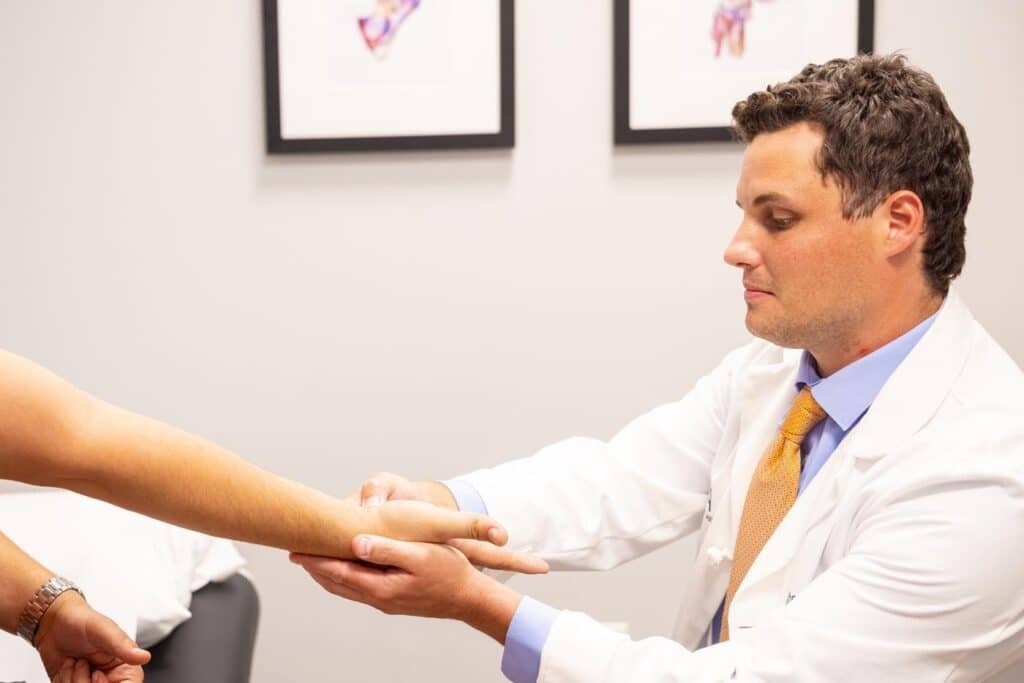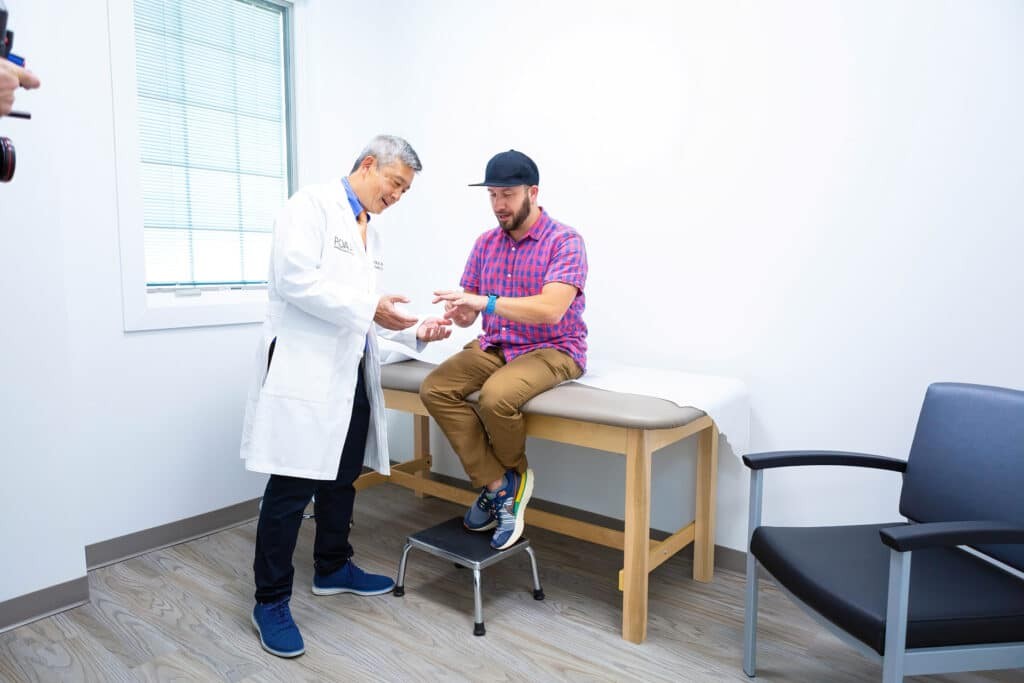Is your hand twitching unexpectedly? WHY.EDU.VN explains the common causes of hand twitching, ranging from everyday stress to potential underlying conditions. Find comprehensive solutions and expert advice to address those involuntary muscle contractions and regain control. Learn about potential tremors and muscle discomfort with us.
1. Understanding Hand Twitching: An Overview
Hand twitching, also known as hand fasciculation, refers to involuntary muscle movements in the hand. These twitches can vary in intensity and frequency, ranging from subtle, barely noticeable tremors to more pronounced and disruptive jerks. The sensation can be unsettling, raising concerns about potential underlying causes. Understanding the nature of hand twitching is the first step toward identifying the cause and finding effective management strategies. This phenomenon, often sporadic and unpredictable, can affect any part of the hand, including the fingers, palm, or even the wrist.
2. Common Symptoms Associated with Hand Twitching
While the primary symptom of hand twitching is the involuntary muscle movement itself, several other symptoms may accompany it, depending on the underlying cause. Recognizing these associated symptoms can provide valuable clues for diagnosis and treatment.
- Muscle Cramps: Sudden, intense muscle contractions in the hand.
- Numbness: A loss of sensation or feeling in the affected area.
- Tingling: A pins-and-needles sensation, often described as prickling or stinging.
- Weakness: Difficulty gripping objects or performing fine motor tasks.
- Pain: Discomfort or aching in the hand, wrist, or forearm.
- Tremors: Rhythmic shaking or trembling of the hand.
- Muscle Stiffness: A feeling of tightness or rigidity in the hand muscles.
3. Potential Causes of Hand Twitching
Hand twitching can arise from a multitude of factors, ranging from benign lifestyle issues to more serious underlying medical conditions. Identifying the potential cause is crucial for determining the appropriate course of action.
3.1. Lifestyle Factors
Certain lifestyle factors can significantly contribute to hand twitching. Addressing these factors can often alleviate the problem.
- Stress and Anxiety: High levels of stress and anxiety can manifest as muscle tension and twitching.
- Caffeine Intake: Excessive consumption of caffeine and other stimulants can overstimulate the nervous system, leading to muscle spasms.
- Dehydration: Insufficient fluid intake can disrupt electrolyte balance, causing muscle cramps and twitches.
- Nutritional Deficiencies: Deficiencies in essential nutrients like magnesium, potassium, and calcium can impair muscle function.
- Lack of Sleep: Insufficient sleep can disrupt the nervous system, leading to muscle twitching and spasms.
3.2. Repetitive Strain and Overuse
Engaging in activities that involve repetitive hand movements can lead to muscle fatigue and twitching.
- Typing: Prolonged typing, especially with poor ergonomics, can strain hand muscles.
- Gaming: Intensive gaming sessions can cause muscle fatigue and twitching.
- Playing Musical Instruments: Repetitive hand movements while playing instruments can lead to overuse injuries.
- Assembly Line Work: Repetitive tasks in manufacturing or assembly lines can strain hand muscles.
3.3. Medical Conditions
In some cases, hand twitching can be a symptom of an underlying medical condition.
- Carpal Tunnel Syndrome: Compression of the median nerve in the wrist can cause hand twitching, numbness, and pain.
- Arthritis: Inflammation of the joints can lead to muscle spasms and twitching.
- Nerve Damage: Injury or damage to nerves in the hand or arm can cause involuntary muscle movements.
- Multiple Sclerosis (MS): This autoimmune disease can affect the brain and spinal cord, leading to muscle twitching and other neurological symptoms.
- Parkinson’s Disease: This progressive neurological disorder can cause tremors, muscle stiffness, and twitching.
- Amyotrophic Lateral Sclerosis (ALS): Also known as Lou Gehrig’s disease, ALS is a progressive neurodegenerative disease that affects nerve cells in the brain and spinal cord, leading to muscle weakness, twitching, and atrophy.
- Benign Essential Tremor: A neurological disorder that causes involuntary shaking, often in the hands.
- Dystonia: A neurological movement disorder that causes involuntary muscle contractions, leading to repetitive or twisting movements.
- Hypocalcemia: A condition characterized by low levels of calcium in the blood, which can cause muscle cramps and twitching.
- Hyperthyroidism: An overactive thyroid gland can lead to muscle weakness, twitching, and tremors.
- Medication Side Effects: Certain medications, such as diuretics, corticosteroids, and some antipsychotics, can cause muscle twitching as a side effect.
3.4. Other Potential Causes
- Electrolyte Imbalance: Disruptions in the balance of electrolytes like sodium, potassium, and calcium can affect muscle function.
- Dehydration: Inadequate fluid intake can lead to muscle cramps and twitches.
- Cold Exposure: Exposure to cold temperatures can cause muscles to contract and twitch.
4. Diagnostic Procedures for Hand Twitching
If hand twitching is persistent, severe, or accompanied by other concerning symptoms, it’s essential to consult a healthcare professional. The diagnostic process may involve:
- Medical History Review: The doctor will ask about your symptoms, medical history, lifestyle factors, and any medications you’re taking.
- Physical Examination: The doctor will examine your hand, wrist, and arm to assess muscle strength, reflexes, and range of motion.
- Neurological Examination: The doctor will assess your nerve function, coordination, and sensory perception.
- Electromyography (EMG): This test measures the electrical activity of muscles and nerves, helping to identify nerve damage or muscle disorders.
- Nerve Conduction Studies: These tests measure how quickly electrical signals travel along nerves, helping to detect nerve compression or damage.
- Blood Tests: Blood tests can help identify underlying medical conditions, such as electrolyte imbalances, thyroid disorders, or nutritional deficiencies.
- Imaging Studies: X-rays, MRI scans, or CT scans may be used to visualize the bones, joints, and soft tissues of the hand and wrist, helping to identify structural abnormalities or nerve compression.
5. Treatment Options for Hand Twitching
The treatment for hand twitching depends on the underlying cause. In many cases, simple lifestyle modifications and home remedies can effectively alleviate the symptoms.
5.1. Lifestyle Modifications
- Stress Management: Practicing relaxation techniques like deep breathing, meditation, or yoga can help reduce stress and anxiety.
- Caffeine Reduction: Limiting caffeine intake can help prevent overstimulation of the nervous system.
- Hydration: Drinking plenty of water can help maintain electrolyte balance and prevent muscle cramps.
- Nutritional Balance: Eating a balanced diet rich in essential nutrients can support muscle function.
- Adequate Sleep: Getting enough sleep can help regulate the nervous system and reduce muscle twitching.
- Ergonomic Adjustments: Optimizing your workspace and posture can reduce strain on hand muscles.
- Use an ergonomic keyboard and mouse.
- Adjust your chair height to ensure proper posture.
- Take frequent breaks to stretch and rest your hands.
5.2. Home Remedies
- Warm Compresses: Applying warm compresses to the affected area can help relax muscles and relieve pain.
- Massage: Gently massaging the hand can help improve blood flow and reduce muscle tension.
- Stretching Exercises: Performing regular stretching exercises can improve flexibility and reduce muscle stiffness.
- Over-the-Counter Pain Relievers: Medications like ibuprofen or acetaminophen can help relieve pain and inflammation.
- Topical Creams: Creams containing menthol or capsaicin can provide temporary pain relief.
5.3. Medical Treatments
In some cases, medical treatments may be necessary to address the underlying cause of hand twitching.
- Physical Therapy: A physical therapist can provide exercises and techniques to strengthen muscles, improve flexibility, and reduce pain.
- Occupational Therapy: An occupational therapist can help you learn new ways to perform tasks that reduce strain on your hands.
- Medications: Depending on the underlying condition, medications may be prescribed to manage pain, inflammation, or nerve damage.
- Muscle Relaxants: These medications can help reduce muscle spasms and twitching.
- Anti-Inflammatory Drugs: These medications can help reduce inflammation and pain.
- Nerve Pain Medications: These medications can help manage nerve pain associated with conditions like carpal tunnel syndrome.
- Injections: Injections of corticosteroids or Botox may be used to relieve pain and reduce muscle spasms.
- Surgery: In rare cases, surgery may be necessary to release compressed nerves or correct structural abnormalities.
6. Preventive Measures to Reduce Hand Twitching
Adopting preventive measures can help reduce the risk of developing hand twitching.
- Maintain a Healthy Lifestyle: Eat a balanced diet, stay hydrated, get enough sleep, and manage stress.
- Practice Good Ergonomics: Optimize your workspace and posture to reduce strain on hand muscles.
- Take Regular Breaks: Take frequent breaks to stretch and rest your hands, especially during repetitive tasks.
- Avoid Overuse: Avoid activities that can strain your hand muscles.
- Warm-Up Exercises: Perform warm-up exercises before engaging in activities that involve repetitive hand movements.
- Stay Active: Regular exercise can help improve muscle strength and flexibility.
7. When to Seek Professional Medical Advice
While occasional hand twitching is usually harmless, it’s essential to seek professional medical advice if:
- The twitching is persistent or worsening.
- The twitching is accompanied by other symptoms like pain, numbness, or weakness.
- The twitching interferes with your daily activities.
- You have concerns about the underlying cause of the twitching.
- You have a history of neurological conditions.
An orthopedic specialist or neurologist can properly diagnose the cause of your hand twitching and recommend the most appropriate treatment plan. At WHY.EDU.VN, we connect you with specialists who can address your specific concerns.
8. Real-Life Scenarios and Solutions
Scenario 1: A student experiences hand twitching after long hours of studying and typing.
- Solution: The student should take regular breaks, stretch their hands, adjust their study setup for better ergonomics, and ensure they are getting enough sleep.
Scenario 2: An office worker notices hand twitching after prolonged use of a computer mouse.
- Solution: The worker should switch to an ergonomic mouse, adjust their desk height, take frequent breaks, and perform hand exercises to relieve muscle tension.
Scenario 3: An athlete experiences hand twitching after intense weightlifting sessions.
- Solution: The athlete should ensure proper hydration, consume a balanced diet with adequate electrolytes, and allow sufficient rest for muscle recovery.
9. The Role of WHY.EDU.VN in Providing Reliable Information
WHY.EDU.VN is dedicated to providing accurate, reliable, and up-to-date information on a wide range of health topics, including hand twitching. Our team of experts researches and curates content from trusted sources to ensure that our readers receive the most comprehensive and helpful information possible. We aim to empower individuals to make informed decisions about their health and well-being.
10. Expert Opinions and Medical Studies
- According to the National Institute of Neurological Disorders and Stroke (NINDS), muscle twitching can be caused by a variety of factors, including nerve damage, electrolyte imbalances, and certain medications.
- A study published in the Journal of Hand Surgery found that repetitive strain injuries are a common cause of hand twitching and pain.
- Experts at the Mayo Clinic recommend maintaining a healthy lifestyle, practicing good ergonomics, and taking regular breaks to prevent hand twitching.
11. The Psychological Impact of Hand Twitching
Hand twitching can have a significant psychological impact on individuals, leading to anxiety, stress, and reduced quality of life. Understanding the psychological aspects of this condition is crucial for providing comprehensive care.
- Anxiety: The unpredictable nature of hand twitching can cause anxiety and worry about potential underlying medical conditions.
- Stress: The physical discomfort and disruption caused by hand twitching can contribute to increased stress levels.
- Self-Consciousness: Individuals may feel self-conscious about their hand twitching, especially in social situations.
- Frustration: The inability to control hand movements can lead to frustration and feelings of helplessness.
- Reduced Quality of Life: Hand twitching can interfere with daily activities, hobbies, and work, leading to a reduced quality of life.
12. Managing the Psychological Impact
- Education: Providing individuals with accurate information about the causes and treatment options for hand twitching can help alleviate anxiety.
- Counseling: Therapy can help individuals cope with the emotional challenges associated with hand twitching.
- Support Groups: Connecting with others who have experienced hand twitching can provide a sense of community and support.
- Mindfulness Techniques: Practicing mindfulness techniques can help individuals manage stress and anxiety.
13. Hand Twitching in Different Age Groups
Hand twitching can affect individuals of all ages, but the causes and treatment approaches may vary depending on the age group.
13.1. Children and Adolescents
- Causes: Hand twitching in children and adolescents may be caused by factors such as stress, anxiety, nutritional deficiencies, or underlying medical conditions.
- Treatment: Treatment may involve addressing lifestyle factors, providing emotional support, and treating any underlying medical conditions.
13.2. Adults
- Causes: Hand twitching in adults may be caused by factors such as repetitive strain, overuse, stress, anxiety, or underlying medical conditions.
- Treatment: Treatment may involve lifestyle modifications, physical therapy, medications, or surgery, depending on the underlying cause.
13.3. Seniors
- Causes: Hand twitching in seniors may be caused by factors such as age-related changes, underlying medical conditions, or medication side effects.
- Treatment: Treatment may involve managing underlying medical conditions, adjusting medications, and providing supportive care.
14. Emerging Research and Future Directions
Ongoing research is focused on better understanding the causes and mechanisms of hand twitching, as well as developing more effective treatments.
- Genetic Studies: Researchers are investigating the role of genetics in predisposing individuals to hand twitching.
- Neuroimaging Studies: Advanced neuroimaging techniques are being used to study the brain activity associated with hand twitching.
- Clinical Trials: Clinical trials are evaluating the effectiveness of new medications and therapies for hand twitching.
15. Detailed Overview Table of Causes, Symptoms, and Treatments
| Cause | Symptoms | Treatment |
|---|---|---|
| Stress and Anxiety | Muscle tension, twitching, increased heart rate | Relaxation techniques, therapy, stress management |
| Caffeine Overuse | Muscle spasms, tremors, restlessness | Reduce caffeine intake, switch to decaffeinated beverages |
| Dehydration | Muscle cramps, fatigue, dizziness | Increase fluid intake, electrolyte replacement |
| Nutritional Deficiencies | Muscle weakness, twitching, fatigue | Balanced diet, vitamin and mineral supplements |
| Repetitive Strain Injury | Pain, numbness, tingling, twitching | Ergonomic adjustments, rest, physical therapy |
| Carpal Tunnel Syndrome | Numbness, tingling, pain, twitching | Wrist splints, physical therapy, surgery |
| Arthritis | Pain, swelling, stiffness, twitching | Anti-inflammatory medications, physical therapy, joint support |
| Nerve Damage | Numbness, weakness, twitching | Pain management, physical therapy, surgery |
| Multiple Sclerosis | Muscle weakness, twitching, fatigue | Disease-modifying therapies, symptom management |
| Parkinson’s Disease | Tremors, stiffness, slow movement, twitching | Medications, deep brain stimulation |
| Benign Essential Tremor | Involuntary shaking, twitching | Medications, lifestyle adjustments |
| Dystonia | Involuntary muscle contractions, twitching | Medications, Botox injections, deep brain stimulation |
| Hypocalcemia | Muscle cramps, twitching, seizures | Calcium supplements, vitamin D supplements |
| Hyperthyroidism | Muscle weakness, twitching, tremors | Medications, radioactive iodine therapy, surgery |
| Medication Side Effects | Muscle twitching, spasms | Adjust medication dosage, switch to alternative medication |
| Amyotrophic Lateral Sclerosis | Muscle weakness, twitching, slurred speech, difficulty swallowing | Riluzole, supportive care |
| Electrolyte Imbalance | Muscle weakness, twitching, irregular heartbeat | Electrolyte replacement, address underlying cause |
| Cold Exposure | Muscle stiffness, twitching | Warm clothing, warm beverages |



16. Alternative Therapies for Hand Twitching
Some individuals find relief from hand twitching through alternative therapies.
- Acupuncture: This traditional Chinese medicine technique involves inserting thin needles into specific points on the body to stimulate energy flow and promote healing.
- Massage Therapy: Massaging the affected area can help relax muscles, improve blood flow, and reduce pain.
- Yoga: Practicing yoga can help improve flexibility, reduce stress, and promote relaxation.
- Biofeedback: This technique involves using electronic devices to monitor physiological responses, such as muscle tension, and learn how to control them.
17. Debunking Myths About Hand Twitching
- Myth: Hand twitching is always a sign of a serious medical condition.
- Fact: Hand twitching is often caused by benign factors like stress, caffeine, or dehydration.
- Myth: There is no treatment for hand twitching.
- Fact: Many effective treatments are available, ranging from lifestyle modifications to medical interventions.
- Myth: Hand twitching is contagious.
- Fact: Hand twitching is not contagious.
18. Case Studies: Successful Management of Hand Twitching
- Case Study 1: A 35-year-old woman experienced hand twitching due to carpal tunnel syndrome. After undergoing surgery to release the compressed nerve, her symptoms resolved completely.
- Case Study 2: A 50-year-old man experienced hand twitching due to stress and anxiety. After starting therapy and practicing relaxation techniques, his symptoms significantly improved.
19. Tips for Managing Hand Twitching at Work
- Ergonomic Setup: Ensure your workstation is ergonomically optimized.
- Regular Breaks: Take frequent breaks to stretch and rest your hands.
- Proper Posture: Maintain good posture while working.
- Hand Exercises: Perform hand exercises to relieve muscle tension.
20. Innovations in Hand Twitching Treatment
- Neuromodulation: Techniques like transcranial magnetic stimulation (TMS) and transcranial direct current stimulation (tDCS) are being explored as potential treatments for hand twitching.
- Robotics: Robotic devices are being developed to assist with hand rehabilitation and improve motor function.
21. Resources for Further Information
- National Institute of Neurological Disorders and Stroke (NINDS)
- Mayo Clinic
- American Academy of Orthopaedic Surgeons (AAOS)
- WHY.EDU.VN
22. Detailed FAQ About Hand Twitching
-
What are the most common causes of hand twitching? Common causes include stress, caffeine, dehydration, nutritional deficiencies, and repetitive strain.
-
When should I see a doctor for hand twitching? See a doctor if the twitching is persistent, worsening, or accompanied by other symptoms like pain or numbness.
-
Can carpal tunnel syndrome cause hand twitching? Yes, carpal tunnel syndrome can cause hand twitching, numbness, and pain.
-
What are some home remedies for hand twitching? Home remedies include warm compresses, massage, and stretching exercises.
-
How can I prevent hand twitching at work? Preventative measures include ergonomic adjustments, regular breaks, and proper posture.
-
Is hand twitching always a sign of a serious medical condition? No, hand twitching is often caused by benign factors.
-
Can stress cause hand twitching? Yes, stress and anxiety can lead to muscle tension and twitching.
-
Are there any medications that can cause hand twitching? Yes, certain medications can cause muscle twitching as a side effect.
-
What is the role of physical therapy in treating hand twitching? Physical therapy can help strengthen muscles, improve flexibility, and reduce pain.
-
Are there any alternative therapies for hand twitching? Yes, alternative therapies include acupuncture, massage therapy, and yoga.
23. The Future of Hand Health and WHY.EDU.VN
At WHY.EDU.VN, we are committed to staying at the forefront of hand health information and providing our readers with the most accurate and reliable resources available. Our goal is to empower individuals to take control of their health and well-being. Contact us at 101 Curiosity Lane, Answer Town, CA 90210, United States. Whatsapp: +1 (213) 555-0101. Trang web: WHY.EDU.VN.
24. A Call to Action: Empowering Your Hand Health
Experiencing persistent hand twitching and struggling to find reliable answers? Don’t let uncertainty hold you back. Visit why.edu.vn today to ask questions and connect with experts who can provide the clarity and solutions you need. Our platform offers comprehensive information, expert opinions, and a supportive community to address your concerns. Contact us at 101 Curiosity Lane, Answer Town, CA 90210, United States or Whatsapp: +1 (213) 555-0101. Take the first step towards regaining control of your hand health—because your well-being matters to us.
